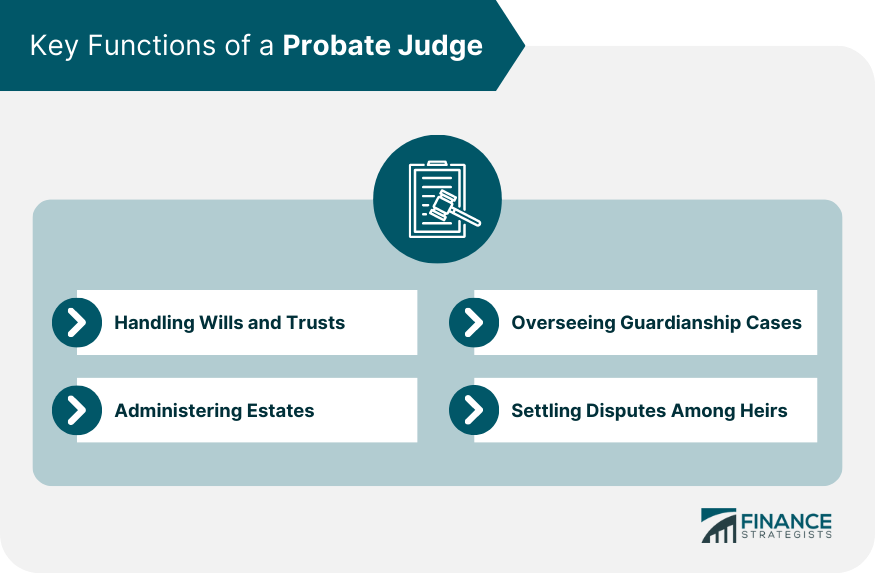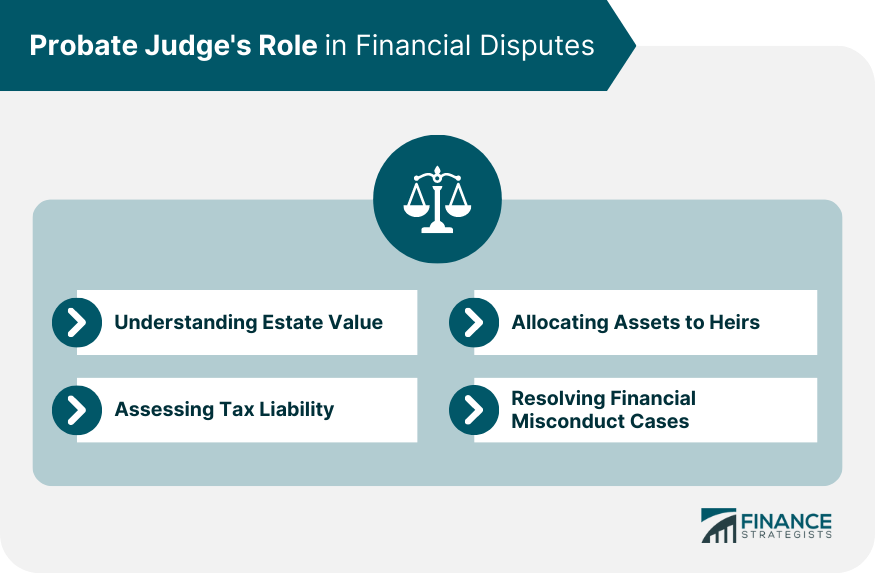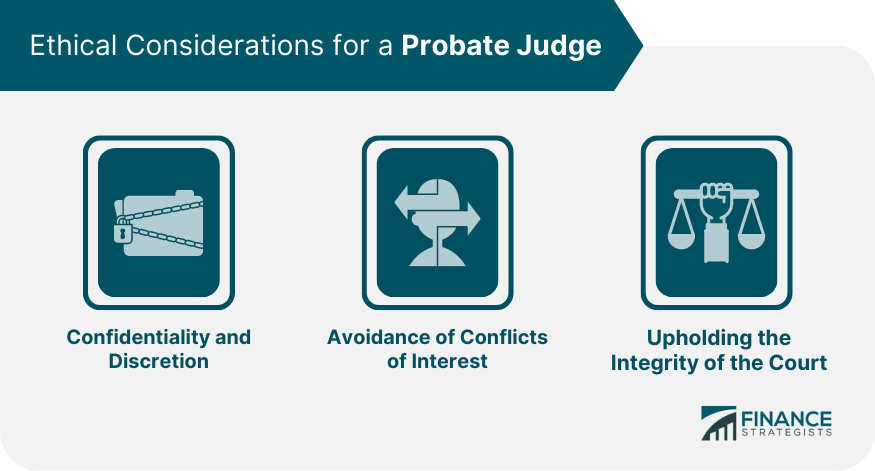A probate judge is a judicial officer who supervises the administration of wills, trusts, estates, guardianships, and conservatorships. They sit in a specialized court, known as a probate court, which primarily deals with issues related to the administration of deceased individuals' estates. Probate judges are typically appointed or elected to their positions, and they are expected to have a thorough understanding of probate law and procedures. They play a crucial role in ensuring that the wishes of the deceased are respected, debts and taxes are paid, and assets are distributed correctly to beneficiaries or heirs. The specific powers of a probate judge can vary depending on the jurisdiction, as the laws governing probate and the organization of probate courts can differ from one region to another. This responsibility requires a thorough understanding of the law and sharp attention to detail. When a person dies, their will becomes subject to probate - a process that validates the will and ensures its proper execution. A probate judge examines the will, ensures its authenticity, confirms that it was created without coercion or fraud, and that it conforms to state laws. Handling trusts, on the other hand, often involves a probate judge when disputes arise. The judge may be required to interpret the trust's terms or decide on issues concerning trust administration. Although trusts are designed to avoid probate, conflicts can still arise, necessitating court involvement. If a will is present, the probate judge reviews it and appoints an executor – often named in the will – to carry out the decedent's wishes. In cases of intestacy, where a person dies without a will, the probate judge appoints an administrator to distribute the estate following state laws. The judge ensures that the executor or administrator carries out their duties effectively and ethically, stepping in to resolve any issues that may arise during the process. These involve appointing a guardian for minors or incapacitated adults who cannot manage their affairs. This responsibility is not taken lightly, as the judge must carefully consider who is best equipped to care for the person in need. Once a guardian is appointed, the probate judge retains oversight to ensure that the guardian is fulfilling their duties appropriately. This oversight can involve reviewing financial reports, assessing the ward's well-being, and adjudicating disputes related to guardianship. When conflicts arise over the interpretation of a will, the distribution of assets, or allegations of fraud or undue influence, the probate court is often the arena for resolution. The probate judge's role is to ensure that the decedent's intentions are upheld and that all parties are treated fairly. This can involve interpreting ambiguous language in the will, hearing evidence of fraud or coercion, and making rulings to rectify imbalances in asset distribution. Through this critical role, probate judges help to maintain peace within families and uphold the integrity of the legal system. Property valuation forms an integral part of this process. Probate judges review appraisals of properties and other significant assets within the estate, including investments, collectibles, and business interests. This appraisal helps establish a clear financial picture of the estate, which is paramount in ensuring fair distribution among heirs. However, property and assets aren't the only elements factored into the estate's value. Judges must also consider any existing debts, like mortgages or loans, as well as ongoing expenses that might affect the estate's net worth. They may order further investigations or appraisals if they suspect inaccuracies or require more information to ensure a comprehensive valuation. It involves a careful review of tax returns and relevant documentation to ensure that all taxes owed by the estate are correctly calculated and promptly settled. Judges must navigate through the complexities of estate tax law, understanding its nuances and applying them accurately to the estate at hand. They need to determine if estate taxes are due and assess the amount accurately. This stage is where their role takes on a particularly personal dimension, as their decisions directly affect the inheritance each beneficiary receives. The judge must ensure that the distribution of assets adheres to the wishes of the decedent as outlined in their will. In the absence of a will, the judge must distribute the estate following the state's laws of intestacy, which usually favor close relatives like spouses, children, and parents. Allocation of assets can often be a point of contention among heirs, and the judge plays a key role in mediating these disputes and ensuring a fair outcome. Their decision-making requires a balance of legal acumen, understanding of the decedent's wishes, and careful consideration of the beneficiaries' needs and expectations. These cases can involve accusations of embezzlement, misappropriation of estate assets, fraudulent behavior by the executor, or other forms of financial abuse. In such situations, probate judges wield the power to investigate the allegations thoroughly, interpret complex financial records, and rule on the matter. They may need to liaise with forensic accountants or other financial experts to decipher intricate financial data and build an accurate picture of what occurred. When financial misconduct is proven, the probate judge has the authority to enforce penalties, including removing the offending executor, ordering restitution of stolen funds, and referring the case for criminal prosecution. Attorneys represent the interests of various parties involved, such as the executors, administrators, heirs, or creditors of the estate. They present arguments, submit evidence, and answer the judge's questions regarding the case. A probate judge must communicate effectively with these attorneys, ensuring that they fully comprehend the proceedings, the interpretation of the law in the context of the case, and the reasoning behind the judge’s decisions. The relationship between a probate judge and attorneys is vital to the successful operation of the probate court. A well-functioning relationship promotes fair and just outcomes for all parties involved, and it also contributes to the public's perception of the court as a credible institution. Financial advisors can provide vital insights into the valuation of assets, potential tax liabilities, and the other implications of various distribution strategies among the heirs. A probate judge may consult financial advisors to gain a more comprehensive understanding of the financial elements of an estate. These professionals can help identify potential issues and offer solutions that can aid the judge in reaching a fair and legally sound decision. The cooperation between the judge and financial advisors is key in ensuring that the distribution of the estate is not only legally accurate but also financially prudent. Their combined knowledge and expertise contribute significantly to the equitable resolution of probate cases. Executors and administrators are appointed by the probate judge to administer the decedent's estate, a task that involves identifying and valuing assets, paying debts and taxes, and distributing the remaining assets to the rightful heirs according to the will or state law. The probate judge oversees their activities, offering guidance when needed and intervening when there are allegations of mismanagement or misconduct. The judge must also review and approve their actions, such as the sale of estate assets or the payment of certain expenses. This supervisory role is essential in ensuring that the estate administration process is carried out lawfully and in the best interests of the beneficiaries. Moreover, the judge interacts with these administrators or executors in court proceedings, hearing their reports, addressing their concerns, and settling any disputes that may arise during the administration process. Together, they play a crucial role in bringing the affairs of the deceased to a satisfactory conclusion. In probate court proceedings, judges often handle sensitive and private information. This ranges from the details of a decedent's financial assets to personal family dynamics that may have influenced the drafting of a will or trust. Maintaining confidentiality involves handling all information discreetly, respecting the privacy of all involved parties, and ensuring that any disclosures made are strictly within the confines of the law. Conflicts of interest can arise in various ways. A judge may know the parties involved personally or professionally, or they may have a personal or financial interest in the outcome of the case. In such situations, it's incumbent upon the judge to recuse themselves from the case. Probate judges must be vigilant in identifying potential conflicts of interest and act swiftly to address them, thereby maintaining their impartiality and the integrity of their role. The court is not just a physical place; it is a symbol of justice, fairness, and the rule of law. Therefore, probate judges must conduct themselves in a manner that enhances public confidence in the judiciary. This responsibility extends beyond the judge's professional life. A probate judge's personal conduct, including their interactions in the community, use of social media, and even political engagements, can impact the public's perception of their impartiality and integrity. Upholding the integrity of the court also involves treating all court participants with respect, ensuring fairness in proceedings, and making decisions based purely on the facts and the law, irrespective of personal beliefs or external pressures. Probate judges are appointed or elected judiciary members with a comprehensive understanding of probate law and procedures. They ensure that the wishes of the deceased are honored, debts and taxes are paid, and assets are distributed correctly to beneficiaries or heirs. They handle a wide range of responsibilities, including examining wills, appointing executors or administrators, overseeing guardianship cases, resolving disputes among heirs, and adjudicating financial misconduct cases. Probate judges work closely with attorneys, financial advisors, and executors or administrators to make fair and legally sound decisions, contributing to the equitable resolution of probate cases. Probate judges must maintain confidentiality, avoid conflicts of interest, and uphold the integrity of the court. They play a crucial role in preserving the wishes of the deceased, maintaining peace within families, upholding the integrity of the legal system, and ensuring the fair distribution of assets.What Is a Probate Judge?
Key Functions of a Probate Judge
Handling Wills and Trusts
Administering Estates
Overseeing Guardianship Cases
Settling Disputes Among Heirs

Probate Judge's Role in Financial Disputes
Understanding Estate Value
Assessing Tax Liability
Allocating Assets to Heirs
Resolving Financial Misconduct Cases

Probate Judges and Other Professionals
Attorneys
Financial Advisors
Executors and Administrators
Ethical Considerations for a Probate Judge
Confidentiality and Discretion
Avoidance of Conflicts of Interest
Upholding the Integrity of the Court

Final Thoughts
Probate Judge FAQs
A probate judge is responsible for overseeing the administration of wills, trusts, estates, guardianships, and conservatorships. They ensure that the wishes of the deceased are respected, debts and taxes are paid, and assets are distributed correctly to beneficiaries or heirs.
Probate judges are typically appointed or elected to their positions. The specific process can vary depending on the jurisdiction. In some cases, they may be appointed by the governor or a local governing body, while in other cases, they may be elected by the public.
Probate judges are expected to have a thorough understanding of probate law and procedures. They often have a legal background, such as being attorneys or having experience in the legal field. Additionally, they may undergo specialized training or education to enhance their knowledge in matters related to probate.
Yes, probate judges have the authority to handle disputes among heirs, including conflicts over the interpretation of a will or allegations of fraud or undue influence. They play a key role in mediating these disputes, ensuring that the decedent's intentions are upheld and that all parties are treated fairly.
Probate judges must maintain confidentiality and discretion when handling sensitive information. They are required to avoid conflicts of interest and recuse themselves from cases where they have personal or financial interests. Upholding the integrity of the court is essential, and probate judges must conduct themselves in a manner that enhances public confidence in the judiciary, both professionally and personally.
True Tamplin is a published author, public speaker, CEO of UpDigital, and founder of Finance Strategists.
True is a Certified Educator in Personal Finance (CEPF®), author of The Handy Financial Ratios Guide, a member of the Society for Advancing Business Editing and Writing, contributes to his financial education site, Finance Strategists, and has spoken to various financial communities such as the CFA Institute, as well as university students like his Alma mater, Biola University, where he received a bachelor of science in business and data analytics.
To learn more about True, visit his personal website or view his author profiles on Amazon, Nasdaq and Forbes.











